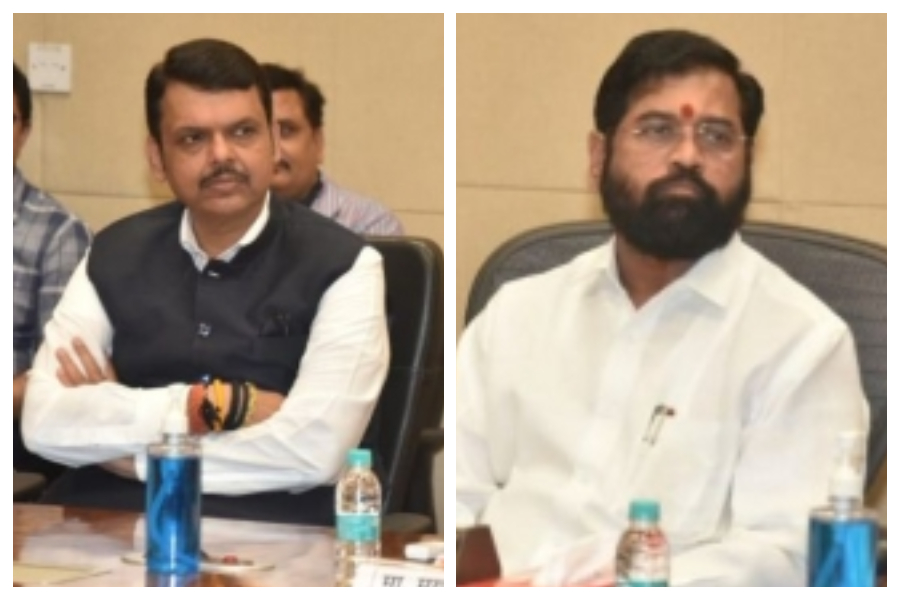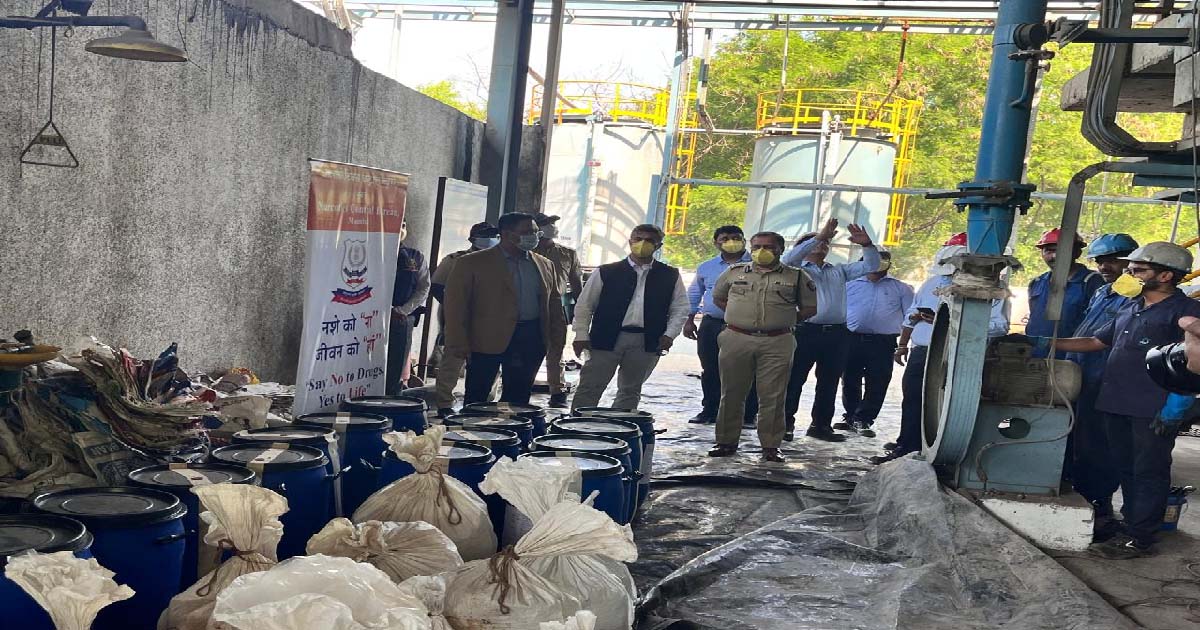Maharashtra
CM Eknath Shinde’s maiden policy move on Metro car-shed kicks up a row

The first policy initiative of new Maharashtra Chief Minister Eknath Shinde and Deputy Chief Minister Devendra Fadnavis to revive the contentious Mumbai Metro car-shed in the eco-sensitive Aarey Colony forests kicked off a major controversy here on Friday.
In the first cabinet meeting after their swearing-in on Thursday, Shinde and Fadnavis decided to give a push to various infrastructure projects, including taking measures to bring back the Mumbai Metro-3 car-shed project to the Aarey Colony jungles.
Former CM Uddhav Thackeray and his son and ex-Environment Minister Aditya Thackeray had scrapped the project and shifted it to the Kanjurmarg salt pans site – which the then Opposition BJP had opposed strongly.
Later, following issues pertaining to the Kanjurmarg land ownership raised by the Centre, the car-shed for the crucial 33-km long Metro line remains stuck in litigation.
Raising the issue on Friday, Shiv Sena President Thackeray called upon the new regime “not to vent its anger against him on the people of Mumbai” on the issue.
“With folded hands I request them on behalf of the people of Mumbai not to bring back the Metro car-shed back to Aarey Colony forests. It was in the interest of Mumbai… Please cancel the proposal to save the city’s environment. There is a lot of wildlife there, and I am feeling very sad about this,” Thackeray appealed to Shinde-Fadnavis.
Referring to the Kanjurmarg land given by the erstwhile Maha Vikas Aghadi (MVA), he said that even that stretch of land belongs to the people and must be put to good use for the masses.
State Congress President Nana Patole warned that shifting the car-shed to Mumbai would be detrimental to the health of the people and the city.
He pointed out how the environmentalists and the people of Mumbai had strongly protested the car-shed at Aarey Colony and even staged demonstrations against the earlier BJP government headed by Fadnavis in October 2019 when over 2,000 trees were chopped down in a single night using the police force.
“Subsequently, the MVA government decided against having the car-shed there and identified the alternative Kanjurmarg site, but there were hurdles created by the Centre and the Opposition BJP,” Patole said, while reiterating that the party is not against against development but it should not be at the cost of the ecology.
Slamming the Shinde-Fadnavis move, the Nationalist Congress Party spokesperson Clyde Crasto said when so many important issues need to be considered in Maharashtra, the new government took the decision to move the car-shed back to Aarey Colony.
“This is recreating a problem solved by the MVA government. The green lung of Mumbai is in danger once again, what will he gain,” Crasto asked.
One of the last surviving green spots in the city, the lush Aarey Colony is spread over more than 3,000 acres with 27 tribal villages, harbours rich flora and fauna, and serves as a buffer between Mumbai and the adjacent Sanjay Gandhi National Park.
Maharashtra
Byculla Redevelopment Site Accident Claims Two Lives

Mumbai: A tragic incident occurred on saturday afternoon at the proposed redevelopment site of Habib Mansion in Byculla (West). During piling work, the ground suddenly caved in, resulting in the death of two labourers on the spot.
Two to three other workers suffered serious injuries and were rushed to a nearby hospital. The accident took place at the Sundar Galli stretch between Haines Road and Tank Pakhadi Road, where redevelopment work is being undertaken by Ibrahim Jusab Sopariwala & Others. The project is linked to architects A2 Associates and Rajpurkar Associates, with ZZ Consultants reported as the structural advisors.
Local residents claimed that adequate safety measures were missing at the worksite, raising concerns about negligence. Police and BMC officials have cordoned off the area and launched an investigation.
Authorities said a detailed probe will determine whether safety protocols were violated during the redevelopment work.
Maharashtra
NCB seizes city drugs, sets them on fire

Mumbai: The Mumbai Zonal Unit of the Mumbai Narcotics Control Bureau (NCB) has disposed of about 1835 kg of Mephedrone along with 341 kg of other substances which were seized from various places in Maharashtra and Delhi. 16 persons were arrested in this case. A thorough investigation into the massive drug seizure led to the arrest of several persons including foreigners from various places, resulting in the elimination of close associates of the drug peddlers with international links.
As per the guidelines prescribed by the Hon’ble Supreme Court, a high-level Drug Disposal Committee was constituted comprising Deputy Director General (SWR) of NCB, Additional Director, NCB Mumbai Zonal Unit and Additional Commissioner of Pune Police. The case was reviewed and it was selected to dispose of the drug hoard. Accordingly, all legal conditions were complied with after which the seized drugs along with other chemicals were finally destroyed by incineration in the presence of HLDCC on 14th November 2025 at Maple, Ranjangaon, Pune, Maharashtra.
This significant seizure of drugs followed by disposal of the sub-judices, indicates the continuous efforts of NCB in dismantling organised drug syndicates and targeting drug offenders who pollute the drug ecosystem. The Bureau is steadfast in its mission to protect public health and uphold the vision of “Nisha Mukt Bharat” by 2047.
NCB is firmly committed to ensuring a drug-free society under the guidance of which it has curbed drug trafficking, broken financial nexus and curbed inter-state and international drug syndicates.
Citizens are urged to play their role by reporting any information related to drugs through the MANS – National Narcotics Helpline (Toll Free Number: 1933). The identity of the informants is kept strictly confidential.
Maharashtra
Three men accused of robbing a youth have been arrested The main accused was apprehended in Titwala.

Mumbai: A young man returning home on a motorcycle in the Asalpha area of Ghatkopar was attacked and forcibly robbed by three men who brandished a chopper. A case was registered at the Ghatkopar police station under sections 309(4), 3(5) of the Indian Penal Code, sections 4, 25 of the Indian Penal Code, and sections 37(1) and 135 of the Indian Penal Code.
The complainant, Suraj Mahadev Dethe (24), and his friend, Yash Kamble, were passing near the Home Guard Training Center at approximately 1:30 a.m. on November 12th when three unidentified individuals in a three-wheeled tempo stopped them. The accused, using the chopper as a pointer, assaulted them, abused them, and stole their Honda Dio scooter and mobile phone.
As soon as the case was registered, the Assistant Commissioner of Police and Senior Police Inspector of the Ghatkopar Division inspected the scene. Based on technical and traditional investigations, the accused identified Hussain Aslam Memon, alias Genda. Upon receiving information that he was hiding in the Titwala area, the police apprehended him. During interrogation, he revealed the names of his accomplices – Munna Ramvilas Sharma and Dilshaduddin Sitabuddin Shaikh – who were subsequently arrested.
On November 13, the three accused were produced in court, where they were remanded to police custody until November 17. The investigation also revealed that Genda is a notorious criminal with more than 13 cases registered against him in various police stations.
-

 Crime3 years ago
Crime3 years agoClass 10 student jumps to death in Jaipur
-

 Maharashtra1 year ago
Maharashtra1 year agoMumbai Local Train Update: Central Railway’s New Timetable Comes Into Effect; Check Full List Of Revised Timings & Stations
-

 Maharashtra1 year ago
Maharashtra1 year agoMumbai To Go Toll-Free Tonight! Maharashtra Govt Announces Complete Toll Waiver For Light Motor Vehicles At All 5 Entry Points Of City
-

 Maharashtra1 year ago
Maharashtra1 year agoFalse photo of Imtiaz Jaleel’s rally, exposing the fooling conspiracy
-

 National News1 year ago
National News1 year agoMinistry of Railways rolls out Special Drive 4.0 with focus on digitisation, cleanliness, inclusiveness and grievance redressal
-

 Maharashtra1 year ago
Maharashtra1 year agoMaharashtra Elections 2024: Mumbai Metro & BEST Services Extended Till Midnight On Voting Day
-

 National News1 year ago
National News1 year agoJ&K: 4 Jawans Killed, 28 Injured After Bus Carrying BSF Personnel For Poll Duty Falls Into Gorge In Budgam; Terrifying Visuals Surface
-

 Crime1 year ago
Crime1 year agoBaba Siddique Murder: Mumbai Police Unable To Get Lawrence Bishnoi Custody Due To Home Ministry Order, Says Report












